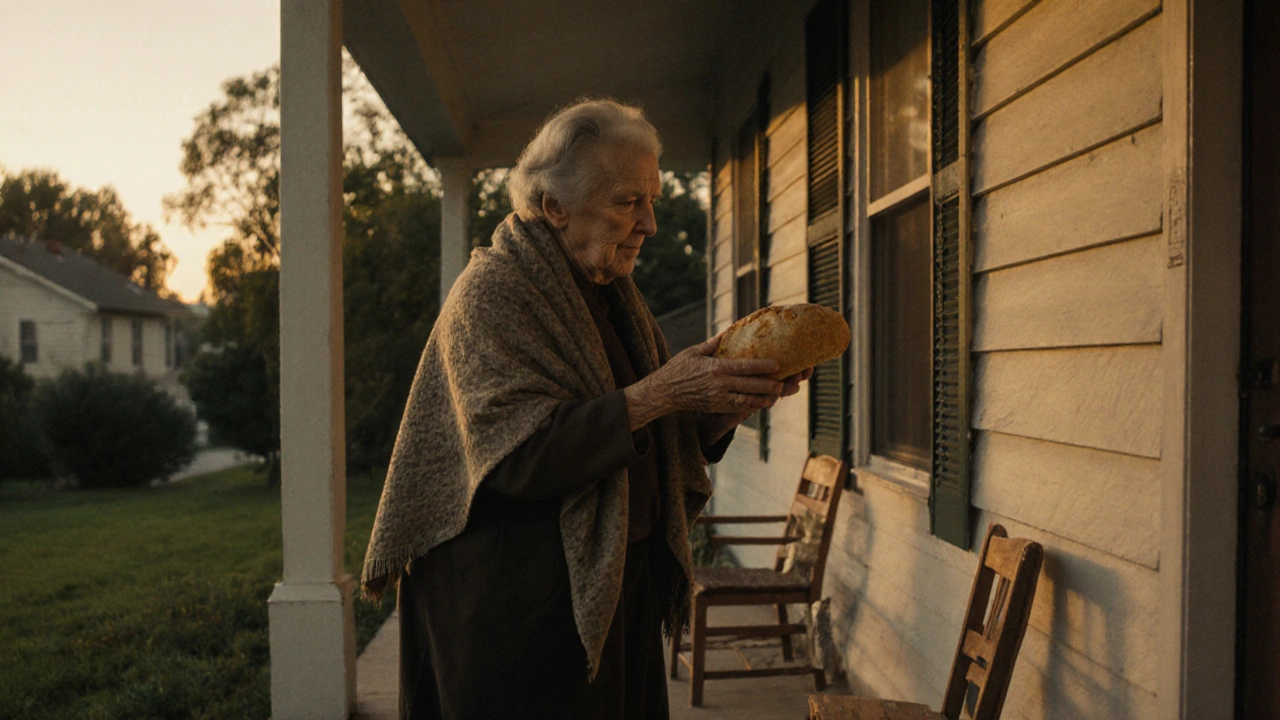
Narrative Topic Strength Checker
How Strong is Your Narrative Topic?
Enter your narrative topic below. Our tool analyzes it against key elements of resonant storytelling based on real narrative psychology. See exactly what makes your topic compelling or where it needs refinement.
Topic Assessment
Your narrative topic shows strong potential for resonating with readers. To maximize impact, consider adding more nuanced moral choices and deepening the focus on personal experience rather than the event itself. Remember: the most powerful stories often lie in the quiet spaces between words.
There’s no single "best" narrative topic. But there are stories that stick. Not because they’re flashy or loud, but because they tap into something quiet and deep inside us. You’ve felt it-reading a novel late at night, or watching a film that leaves you staring at the ceiling, wondering why it got under your skin. That’s not luck. It’s the power of a narrative that connects to something real.
People Don’t Remember Plots. They Remember Feelings.
Think about the stories you still carry with you. Maybe it’s a character who lost everything and kept going. Or someone who chose kindness when revenge was easier. Or a family holding together through silence, not speeches. These aren’t about dragons or space ships or courtroom twists. They’re about the messy, ordinary things we all live through: grief, guilt, hope, belonging.
A study from the University of California found that stories centered on personal transformation-where a character changes because of their choices, not because of external events-were remembered 22% longer than action-driven plots. That’s not because we’re slow. It’s because we’re human. We don’t need explosions. We need resonance.
The Most Powerful Narrative Topics Are the Ones We Avoid Talking About
The best stories don’t shout. They whisper. And they often start with topics we’re taught to ignore: loneliness in old age, the quiet collapse of a marriage, the weight of inherited trauma, the shame of not being enough even when you’ve done everything right.
Look at the novels that became cultural landmarks-Beloved, The Remains of the Day, My Brilliant Friend. None of them have high-stakes battles or last-minute rescues. They’re about what happens when people try to live honestly in broken systems. That’s why they endure. They don’t offer escape. They offer recognition.
When you write about something uncomfortable, you’re not being dark. You’re being truthful. And truth, even when it’s heavy, is magnetic.
What Makes a Narrative Topic Universal?
It’s not about geography or culture. It’s about the human condition. The best narrative topics work because they’re built on foundations everyone understands:
- Loss and survival-What do you do when the person you needed is gone?
- Identity and belonging-Who are you when the world keeps telling you who you should be?
- Moral ambiguity-When the right choice hurts everyone, including you?
- Quiet courage-Getting up when you have no reason to.
- Forgiveness-Not for others. For yourself.
These aren’t abstract ideas. They’re lived experiences. A single mother working two jobs to keep her kid in school. A man who never talks about his father’s death but still leaves his chair empty at dinner. A teenager who pretends to be fine because asking for help feels like weakness.
These are the moments that become stories. Not because they’re dramatic. But because they’re real.

Why "Hero’s Journey" Doesn’t Always Work
You’ve heard the formula: ordinary world → call to adventure → trials → victory. It’s clean. It’s taught in screenwriting courses. But real life doesn’t follow that arc. Most of us don’t get a mentor. We don’t defeat a villain. We don’t get a standing ovation.
Look at The God of Small Things by Arundhati Roy. There’s no hero. No clear antagonist. No tidy ending. Instead, there’s a family unraveling under the weight of caste, silence, and unspoken grief. It’s not structured like a movie. It’s structured like memory. And that’s why it haunts you.
The best narratives don’t follow the rules. They break them-because real pain doesn’t fit into three acts. Real healing doesn’t come in a final scene. It comes in small, invisible moments: a hand held too briefly, a letter never sent, a silence that says everything.
What to Avoid When Choosing Your Narrative Topic
Not all deep topics work well in stories. Some backfire if they’re handled carelessly.
- Overused trauma-Sexual assault, addiction, abuse. These aren’t off-limits. But using them as plot devices without depth turns pain into spectacle. If you’re writing about trauma, ask: Am I exploring the person, or just the event?
- Too much moral clarity-Good vs. evil stories feel flat. Real life is full of people who mean well and still hurt others. Nuance creates tension. Simplicity creates boredom.
- Forced inspiration-"The little girl who beat cancer and opened a school!" That’s not a story. That’s a slogan. Real resilience is messy. It’s messy days. It’s setbacks. It’s not always victory.
- Trying to be profound-Don’t force big ideas. Let them rise from the details. A character’s worn-out shoes, the way they stir coffee three times before drinking it, the song they hum when they think no one’s listening-those are the clues to deeper truths.

Where to Find Your Best Narrative Topic
You don’t need to invent something new. You need to pay attention.
- Listen to strangers-On the bus, in line at the grocery store, in a waiting room. People drop fragments of their lives without realizing it. "I haven’t spoken to my sister in seven years. She thinks I don’t care." That’s a story starter.
- Look at your own quiet moments-What’s something you’ve never told anyone? Not because it’s shocking, but because it’s too small, too ordinary, too personal? That’s gold.
- Read obituaries-Not for the achievements. For the details: "She baked bread every Sunday for her neighbors," "He kept every postcard his daughter sent." These are the bones of real lives.
- Ask: What do I wish someone had understood about me?"-That’s your topic.
The best stories aren’t found in grand events. They’re hidden in the spaces between words people say-and the ones they never say at all.
Examples That Worked (And Why)
Here are three real stories that became cultural touchstones-not because they were perfect, but because they were honest:
- A Little Life by Hanya Yanagihara-A story about trauma, friendship, and the slow erosion of hope. It’s brutal. But it works because it doesn’t offer redemption. It offers presence. The characters don’t heal. They endure. And that’s enough.
- The Night Watchman by Louise Erdrich-Based on the author’s grandfather, it follows a Native American man fighting to stop a law that would erase tribal land rights. No big battles. No villains in black hats. Just a man writing letters, holding meetings, showing up. Quiet resistance. That’s the story.
- My Year of Rest and Relaxation by Ottessa Moshfegh-A woman decides to sleep for a year. She’s not depressed. She’s exhausted. By the world. By expectations. By the pressure to be happy. It’s darkly funny. And terrifyingly familiar.
What do these have in common? They don’t try to fix anything. They just show what it’s like to carry something heavy. And that’s why people keep reading.
Your Narrative Topic Is Already Inside You
You don’t need to chase the "perfect" theme. You need to stop running from the one that’s already there.
What’s the story you’ve told yourself a hundred times? The one you whisper when you’re alone? The one you never write down because it feels too small, too personal, too raw?
That’s your topic.
Don’t polish it. Don’t make it grand. Don’t try to make it universal. Just tell it honestly. The rest will follow.
The best narrative topic isn’t out there. It’s inside you. Waiting to be spoken, not shouted.
Is there a single best narrative topic for all stories?
No. There’s no universal "best" topic. What works depends on who’s telling it and who’s listening. But the most powerful stories all share one thing: they speak to something real in the human experience-like grief, belonging, quiet courage, or moral ambiguity. The topic isn’t what matters. The truth behind it is.
Can a simple, everyday topic make a great story?
Absolutely. Some of the most unforgettable stories are built on ordinary moments: a parent watching their child sleep, someone re-reading an old letter, a quiet argument over coffee that changes everything. What makes them powerful isn’t the event-it’s the weight behind it. The history, the silence, the unspoken feelings. That’s where the story lives.
Why do some stories with dark themes succeed while others feel exploitative?
It’s about focus. If the story centers on the trauma itself-shocking details, graphic scenes-it becomes spectacle. If it centers on the person living through it-their thoughts, their small acts of survival, their quiet moments of humanity-it becomes a portrait. The difference is empathy versus exploitation. One invites you in. The other pushes you away.
Should I write about what’s popular or what matters to me?
Write what matters to you. Trends fade. Authenticity lasts. Right now, readers are tired of formulaic plots and manufactured emotion. They’re hungry for stories that feel lived-in. If your topic feels personal, even if it’s not trendy, that’s your advantage. Your truth is the one thing no algorithm can replicate.
How do I know if my narrative topic is strong enough?
Ask yourself: Does this topic make me uncomfortable to write about? If not, it might be too safe. The strongest topics challenge you. They make you question your own assumptions. If writing it changes how you see the world-even a little-that’s a sign it’s working.


